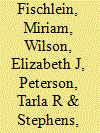|
|
|
Sort Order |
|
|
|
Items / Page
|
|
|
|
|
|
|
| Srl | Item |
| 1 |
ID:
094910


|
|
|
|
|
| Publication |
2010.
|
| Summary/Abstract |
This study applies a socio-technical systems perspective to explore innovation dynamics of two emerging energy technologies with potential to reduce greenhouse gas emissions from electrical power generation in the United States: carbon capture and storage (CCS) and enhanced geothermal systems (EGS). The goal of the study is to inform sustainability science theory and energy policy deliberations by examining how social and political dynamics are shaping the struggle for resources by these two emerging, not-yet-widely commercializable socio-technical systems. This characterization of socio-technical dynamics of CCS and EGS innovation includes examining the perceived technical, environmental, and financial risks and benefits of each system, as well as the discourses and actor networks through which the competition for resources - particularly public resources - is being waged.
|
|
|
|
|
|
|
|
|
|
|
|
|
|
|
|
| 2 |
ID:
137272


|
|
|
|
|
| Summary/Abstract |
As the threats of climate change grow, the need to reduce carbon dioxide (CO2) emissions from fossil fuel burning is increasingly acknowledged by governments around the world. The potential of carbon capture and storage (CCS), a set of technologies that offers a politically appealing vision of a ‘cleaner’ way to use fossil fuels, has provided powerful motivation for large public and private investments in CCS technology. But investing in CCS is controversial because, although some consider it a critical climate mitigation technology, others view it as an expensive fossil fuel subsidy that could inadvertently perpetuate, rather than reduce, fossil fuel reliance.
|
|
|
|
|
|
|
|
|
|
|
|
|
|
|
|
| 3 |
ID:
088214


|
|
|
|
|
| Publication |
2009.
|
| Summary/Abstract |
Closing the gap between carbon dioxide capture and storage (CCS) rhetoric and technical progress is critically important to global climate mitigation efforts. Developing strong international cooperation on CCS demonstration with global coordination, transparency, cost-sharing and communication as guiding principles would facilitate efficient and cost-effective collaborative global learning on CCS, would allow for improved understanding of the global capacity and applicability of CCS, and would strengthen global trust, awareness and public confidence in the technology
|
|
|
|
|
|
|
|
|
|
|
|
|
|
|
|
| 4 |
ID:
121270


|
|
|
|
|
| Publication |
2013.
|
| Summary/Abstract |
Efforts to plan and site transmission for wind power cannot currently keep pace with wind power development. The very nature of wind power, whether distributed or intermittent, challenges traditional models of electricity grid development. Much of the decision authority for transmission is located at the state level, creating tensions between a system-wide need for transmission capacity and the local nature of planning and implementation. This study identifies and discusses barriers for wind power transmission and highlights the critical role of states and state policies in expanding and transforming the electricity grid to accommodate large scale wind power. Drawing on extensive interview data with energy stakeholders, we present a comparative case study of state-level contexts linking wind and transmission in Montana, Minnesota, and Texas. Stakeholders were found to portray transmission challenges and solutions for wind power based on the character of the local transmission grid, their status as power importer, exporter or self-sufficient state, and the role wind already plays in the power supply.
|
|
|
|
|
|
|
|
|
|
|
|
|
|
|
|
|
|
|
|
|